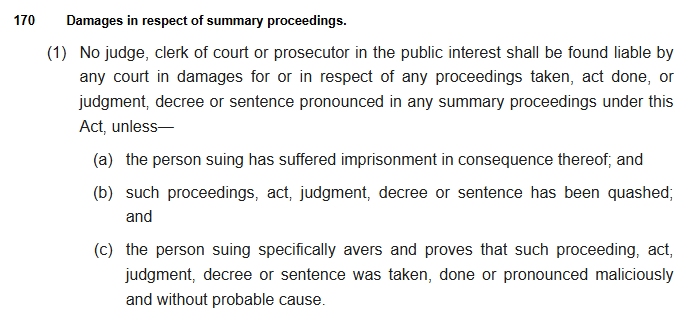SLAPPs
Another article from our regular legal correspondent Ewan Kennedy. I was talking to a usually very well informed political friend during the week and found that she hadn’t heard about SLAPPs, so it’s maybe time to put the word out more generally about what has been becoming a specialism for a section of the legalContinue reading "SLAPPs"
Another article from our regular legal correspondent Ewan Kennedy.

I was talking to a usually very well informed political friend during the week and found that she hadn’t heard about SLAPPs, so it’s maybe time to put the word out more generally about what has been becoming a specialism for a section of the legal profession and a threat to our freedom of speech.
When I sent back my licence fourteen or so years ago it was already obvious that solicitors were no longer one single profession. They had started to divide into several different types of legal business, with a diminishing number still taking on traditional clients, mainly middle class people doing house sales or making wills and a growing bunch of youngsters going for the big money in massive cross national outfits. The very serious drop in lawyers doing criminal defence work is a serious worry in both Scotland and England, while a lot of the most serious civil damages work is supported by private insurance-backed schemes rather than on legal aid. The result is Heaven help you if you find yourself in trouble and you’re neither poor enough for legal aid nor rich enough to hire a KC!
One very unwelcome result of this is the arrival on our shores from America of the SLAPP, the Strategic Litigation against Public Participation. The law courts in many Western countries are being used by the very rich and powerful, many (most?) of whom have gained their wealth through means they would prefer the public didn’t know about, to silence those who have been looking too closely.
We’ve seen an example of this in the last week, with Nadim Zahawi hiring an international law firm, Osborne Clarke, to threaten an activist with a libel case for asking him to come clean about his tax returns. (Zahawi was being interviewed by Laura Kuensberg this morning, but I must have dozed off when she was quizzing him about it). Often we don’t get told when people are silenced; Osborne Clarke had “ordered” the activist not to tell anyone that they were threatening him.
Perhaps the most widely publicised case of a SLAPP recently was the one brought by Arron Banks against Carole Cadwallader, claiming damages for libel in respect of some remarks she made hinting that he might have had Russian connections. What we know about Mr Banks suggests that he is a very wealthy fellow indeed, whereas his target was a well-known and very active investigative journalist, a career that is more likely to get you shot than rich.
Instead of suing the media who published his target’s remarks, Ted Talks and the Guardian, he attacked her personally. She successfully defended herself, but at enormous personal and emotional cost and huge expenditure, funded by outraged citizens who rallied to help at a time when everyone is under strain.
And possibly the earliest case of a SLAPP in the UK was the McLibel case over the hamburger chain, which launched a young barrister called Keir Starmer into public life.
These cases illustrate the prime feature of a SLAPP; there is usually a huge imbalance of financial muscle. In addition to this, classic features are:
The case is brought by an individual or corporation with something to hide.
As it says on the tin, the target is public participation in the exposure of wrongdoing.
The remedy is usually disproportionate and the costs enormous.
There is often no basis whatsoever for the case, or perhaps the case is mainly, but not entirely, unfounded. Often there is no damage of the sort a court will regard as appropriate for compensation; by that I mean reputational damage caused by the disclosure of criminal or some other gross misconduct. In Mr Banks’ case his links with various Russian individuals were already well known and indeed had been publicised by himself.
SLAPPs first came to public attention in the late 1980s in the United States, famously the land of the free, including the Constitutional right to freedom of speech. Judges were recognising court cases that breached this right, with an early case going to the New York Supreme Court. The ruling was based not on any statute, but on the common law power of judges to throw out cases they consider vexatious.
Following the New York case, legislators there and elsewhere got interested. Currently there is legislation in thirty one States in America, plus Quebec, British Columbia and Ontario in Canada, plus the Australian Capital Territory.
In other jurisdictions it’s still down to judges deeming cases to be vexatious. This happened in the South African case of Mineral Sands, where attorneys got sued. In the Republic of Ireland a decision is awaited in a major case re a Dublin housing development, where a property developer is suing.
The advantage of legislation, apart from respecting democratic lawmaking, is to have clear rules giving guidance for judges to follow. The European Commission has recognised this and has a team of experts working on a draft Directive that will basically define what is a SLAPP and set out detailed rules.
Because of another “Brexit benefit” the Scottish and English legal systems will have to rely on the common law rules about vexatious litigations. Unfortunately these have mainly been used here by powerful people and even by the State to silence activists, Robbie the Pict being an example
Finally, in case you’re wondering if a SLAPP could happen here, I can disclose that at least one is already underway, with all the classic features. The exact details are currently under a legal embargo, but if Iain allows me another article they will be published in due course.
MY COMMENTS
As always I am grateful to Ewan. This time he is providing early warning of legal changes that threaten our freedom of speech rights. There is no doubt that our freedoms are under challenge in a great many ways these days in Scotland, not least with jury less trials and far too close relationships between the legal system and the Scottish Government. I look forward to Ewan’s future article that will update the position.
I am, as always
Yours for Scotland
BEAT THE CENSORS
Unfortunately some pro Indy websites are not pro Indy. They are pro SNP sites and ban any content on their sites which dares to question the SNP or the SNP leader. They seek to censor discussion and free expression. Fortunately many of my readers share the articles on Yours for Scotland frequently and because of this the attempted censorship is proving ineffective. This support is very important and I thank everyone who share and protect freedom of speech and choice.
FREE SUBSCRIPTIONS
Are available on the Home and Blog pages of this site. This will ensure you will receive notification of all new posts by email and be the first to get key information when it is released.
SALVO
The progress of Salvo has been the most encouraging development of 2022. It is doing sterling work educating Scots about the Claim of Right and spelling out what it means that the Scottish people are sovereign, not any Parliament. All donations to this site for the remainder of 2022 will be forwarded to Salvo to support them in developing and expanding this valuable work.
LIBERATION.SCOT
Please register at Liberation.scot and join the mass membership organisation that will be the signatories to our application to the UN, debate and organise a new Scottish Constitution. The membership of Liberation is also where the first members of Scotland’s National Congress will be balloted for selection.
What's Your Reaction?











































